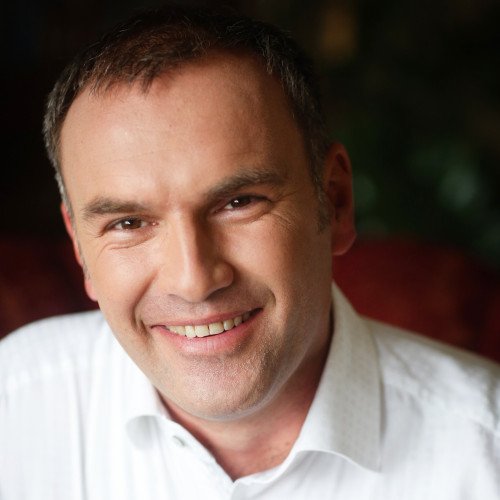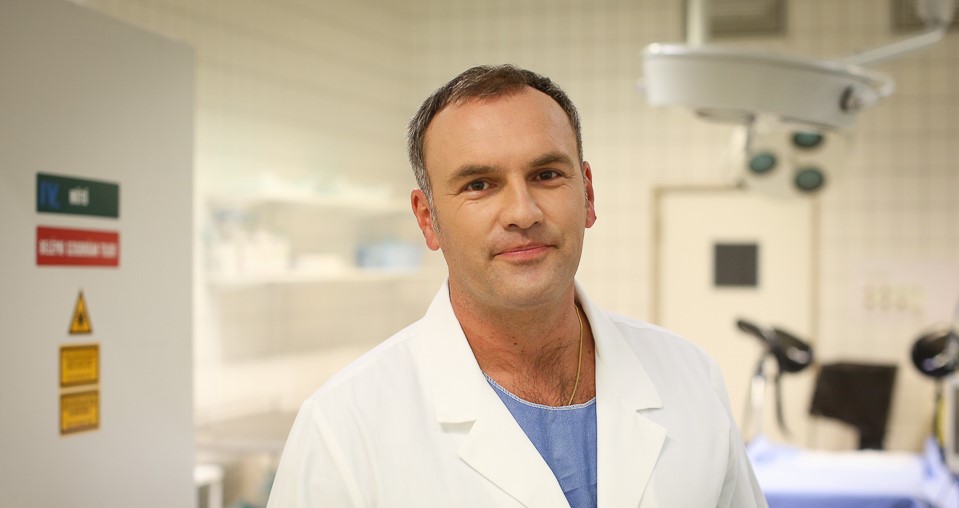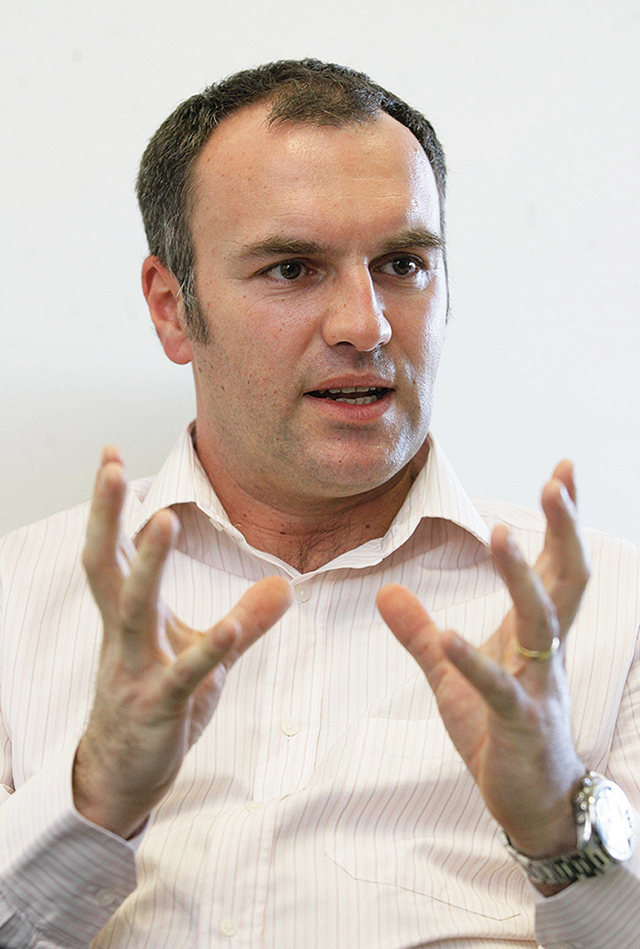
Dr. István Fülöp
![]() english-speaking doctor
english-speaking doctor
A dedicated doctor, a perfectionist leader and a strict and indulgent father of three young children. He is a gadget buff, plays Sudoku, is unsurpassed in his work ethic, and enjoys fishing. Infertility Department, Endoscopic Surgery Center, Endometriosis Center - under his leadership, these three significant medical fields in themselves have been forged into a mutually supporting, interconnected system, because he does not get stuck in the treatment of a single female disease in isolation.
Gadgets
Even when I was a beginner doctor, I was interested in areas that were not part of general care. I was very attracted to endoscopy, as I have always had a special relationship with technical achievements. I was interested in everything that is new in medical technology. I really like the so-called “gadgets”, I like to tinker with them. Compared to traditional gynecological surgeries, the endoscopic operating room is an operating room flooded with “gadgets”. This attracted me immensely – one does not have to operate with a pair of forceps and a scalpel. Endoscopic devices solve problems in a much gentler way and in a shorter time, which is why this is the main tool I use in medicine.
Sudoku
My relationship with infertility treatment has also developed in a special way. When I was a junior doctor, I first encountered a couple's infertility problem, and although I didn't have a deep knowledge of the field, I tried to figure out how many conclusions could be drawn from the available data. In the meantime, I realized that the relatively simple algorithmic processes of general gynecology weren't exciting enough for me. I like to do sudoku, to solve puzzles. When I want to clear my head, I take out a harder sudoku puzzle, and after fifteen minutes I'm fine. So I like it when you don't have to retrace a well-trodden path, but rather line up items next to each other, and it's not easy to draw conclusions from them. Infertility treatment is such a specialty.

Broadening the horizon
That's when I ended up in Munich at a clinic where the infertility department and the endoscopic surgery department were right next to each other. I saw the professor, whom I still consider my greatest mentor, when he operated on an infertility problem, say over the phone to his infertility colleague, "Please come and look at the pelvis." You see, I'm operating on this now, you can see this on the ovary that you'll be working with in a month. Or he said, "Listen, I'm going to cut open the uterus because of the fibroid lump, it will heal in this much time, now it will be much easier for you."
"Time is not only money, it's also a child."
As a result of infertility examinations, diagnostic findings that require an operative solution are often found. Time is of the essence, and a quick recovery is essential. The couple already has a serious problem with infertility, so they need treatment that is as minimally invasive as possible.
The strange tissues
Before I went to Germany, all I knew was that there was a disease called endometriosis. And we either do something with it or we don't. We usually gave her a drug treatment, which she suffered from for six months. When I went out, the first operation I saw was that she was removing tissues in the most impossible places. I asked why, because at home, although I often see this, we don't even touch it. The professor looked at me strangely, how could I not know this, since this is what causes the cramps, the adhesions, this is one of the most common causes of infertility.
I came home, went into the operating room and there were the same strange tissues. I asked the colleague why don't you remove them? They are there, we don't deal with them - came the answer. The day before yesterday they were very busy with it in Munich, I said. They waved at me, I think they thought I was a clever little beginner.
In Hungary, at that time, endoscopic surgery was lagging behind Western standards. There wasn't enough money for technology, there weren't enough trained specialists. I would have liked to stay at the German clinic, but luckily for me, an endoscopic center was established in Budapest at that time, and they were looking for a young specialist. Since this center had outlived its usefulness ten years ago, I naturally agreed. The German professor came here to operate. We performed twenty surgeries a week, it was an incredible learning opportunity.
It was incredibly good to be part of a working group whose results even the profession was amazed by. As soon as infertility treatment and endoscopy were combined, the success rate immediately jumped. Myoma nodules were removed, endometriosis was removed, and women became pregnant. Endometriosis treatment was already of particular importance at that time, as colleagues from all over the country referred patients here and attended further training courses.
By the time the Róbert Károly Private Clinic, the predecessor of the TritonLife Róbert Private Hospital, was established, I was ready to lead the infertility and endoscopy center. The knowledge and experience I had gained prompted me to develop a new system.
System
I have a strong inner urge to always do something new, a little more, bring in more, learn more, add more. Together with my colleagues and business partners, we built this system, which is an alternative to state healthcare in its business model and a competitor in terms of its professional quality.
The fact that we perform very special operations in endoscopic surgery, while other institutions with endoscopic skills are only just starting to appear, is a success for me. The fact that patients come here from state-funded, renowned institutions is also a success. And also that more than once a patient comes who could not be treated elsewhere, we operate on her, and she leaves healthy.
I am proud that when I was 35 years old, when I established this place, we went from 80 treatments a year to 400 under extremely difficult business conditions. All this with the financing being entirely borne by the patient. We achieve all this by offering special diagnostics and special treatments. Such as laser surgery, autofluorescent diagnostics, and the endometrial fertility index. These provide the patient with an extra that they cannot get anywhere else.
As a leader
It is important to me that my colleagues, with whom I work directly, feel good and do not want to leave. They are involved in all our results, they are extremely committed, they want to do it, and I believe in them.
Some people suggest that I do not teach enough in the operating room, and that the skills I do are accessible to few. This is true in that I only want to pass on the knowledge to those in whom I see the attraction or the investment of energy for it. I have invested a lot of work and energy in making this clinic what it is now. I only expect from everyone what I myself have put on the table. I also choose my assistants based on professionalism and speed. Because when work here picks up, we all have to pick up with it.

Private life
He became a doctor because of an accident and a related hospital experience. "I had a serious accident when I was three and a half years old. I spent months in hospital. When I came out, I said I wanted to be a doctor. I never said anything else again," says Dr. Fülöp.
He is proud, however, that he is an inspiration to his children in choosing a career. "Marci, my oldest son, wanted to be an endoscopic surgeon when he was five. I once caught him in kindergarten examining and operating with broad movements. Csongi sees the world a little more "realistically", I don't think he will choose a medical career. I really love being their father. Three children are much better than two children. And although I am quite strict sometimes, my little girl softened me up a lot. My father was very strict with me, sometimes I envied my friends who had easygoing dads. "Today I don't envy him, I'm grateful for him," says the chief physician.
In his free time, he likes to go fishing: "We sit down to catch the game. My father also loved fishing, but unfortunately we didn't spend much time together, we couldn't fish much together. Marci was one year old when my father left. He didn't see anyone teach him how to fish. He didn't even see a fishing rod. Yet last year he decided that he liked to fish. Then I bought more serious equipment, until then I had only been playing with my father's battered rod. And now Marci and Csongi come with me, sometimes they walk around the lake. We sit for three hours, just like I used to sit next to my father and try to catch the game."
 Log in with GoodID
Log in with GoodID